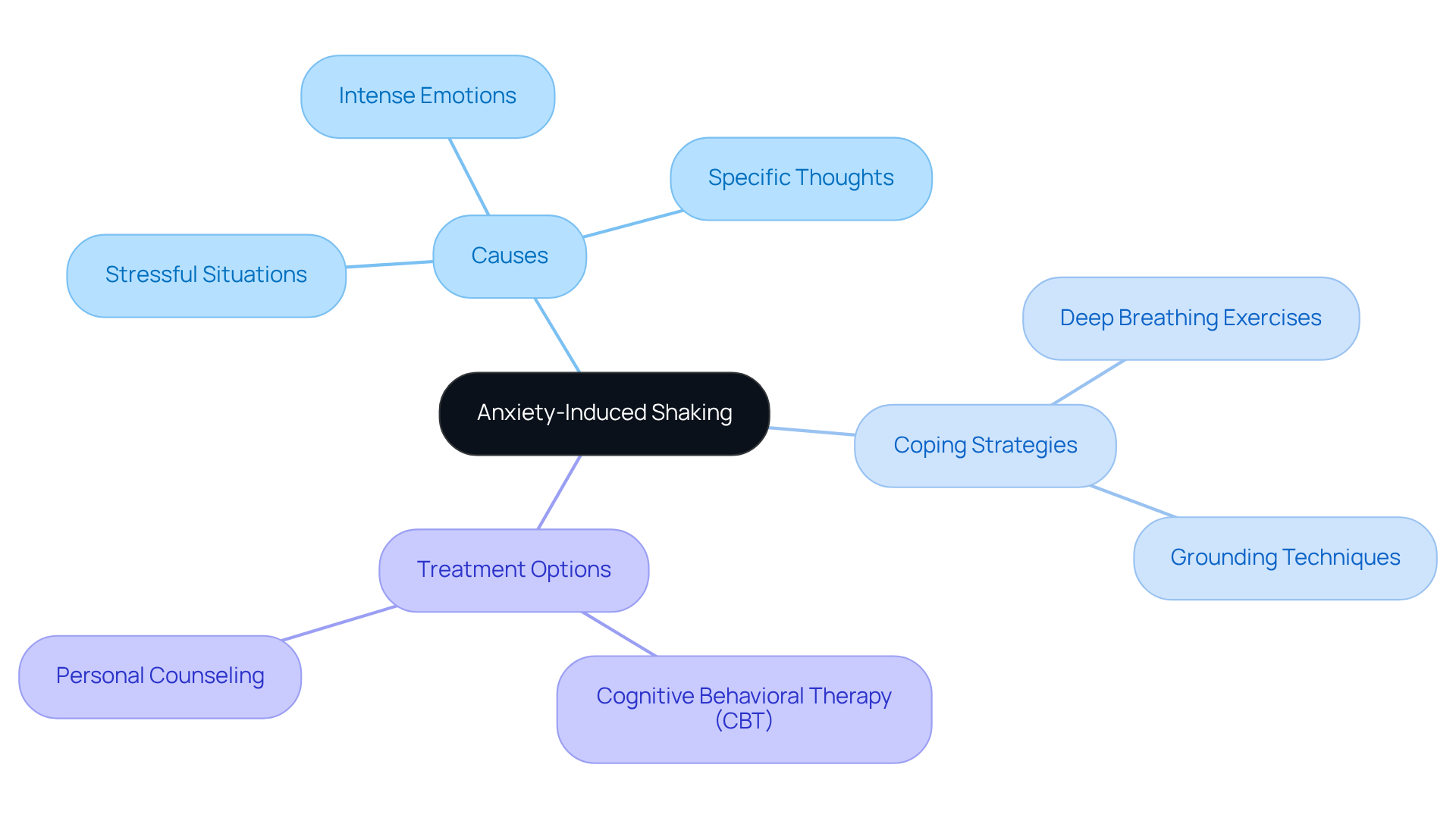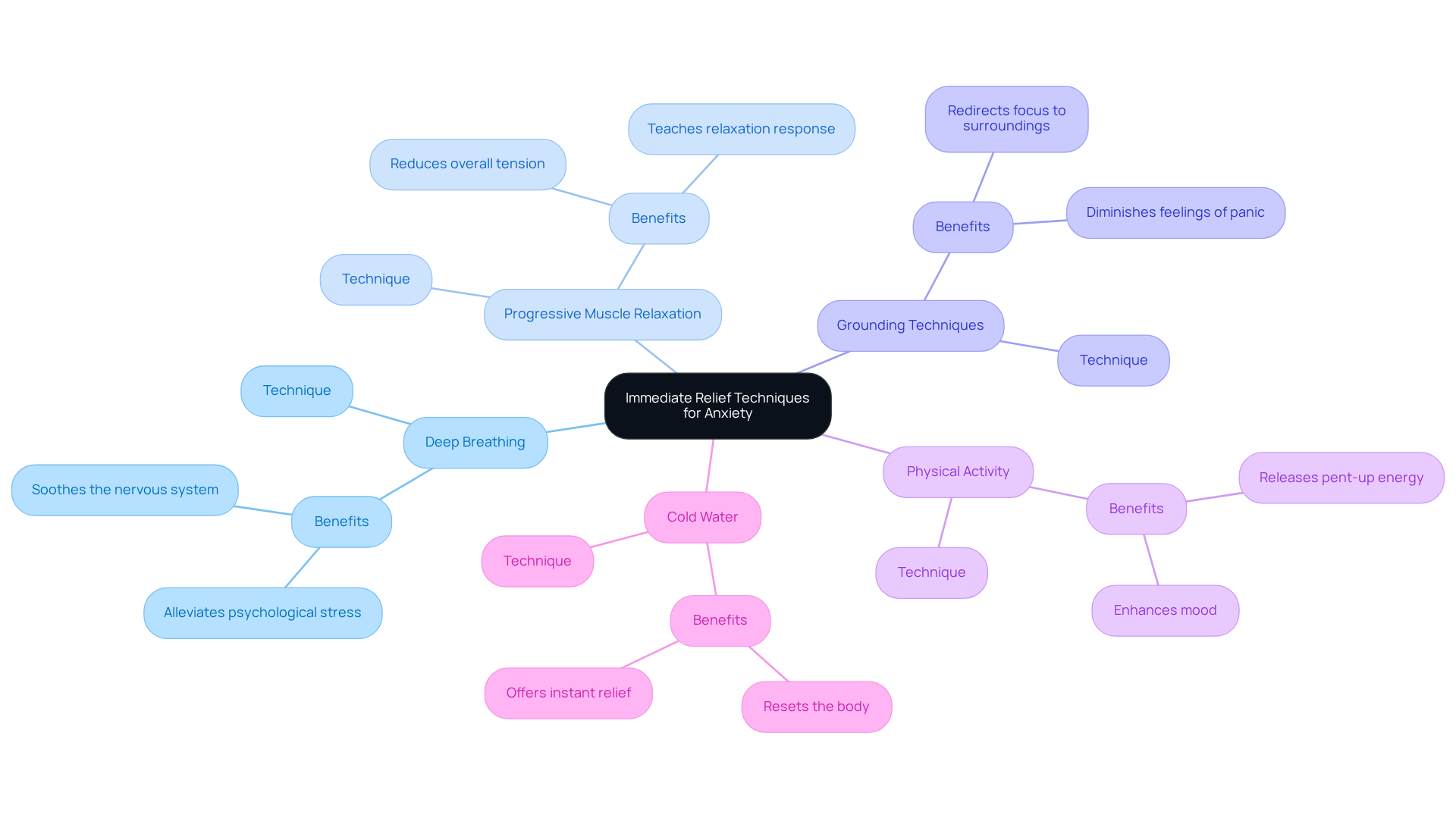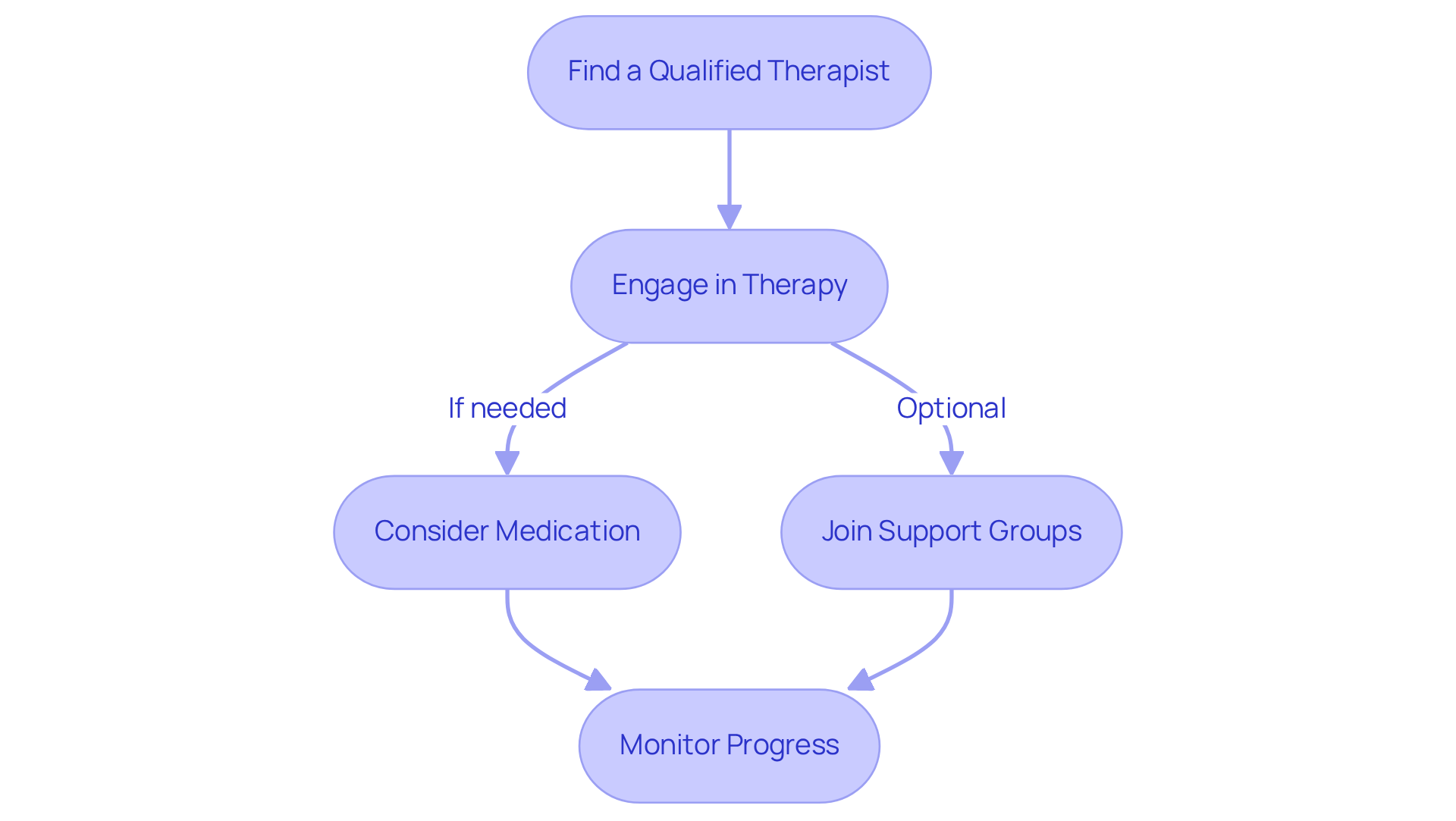Overview
If you find yourself shaking from anxiety, know that you're not alone, and there are effective ways to find relief. Immediate techniques like:
- Deep breathing
- Progressive muscle relaxation
- Grounding exercises
can provide you with quick comfort. Alongside these, incorporating long-term strategies such as:
- Regular exercise
- Cognitive behavioral therapy (CBT)
can lead to lasting change. Understanding the physiological basis of anxiety-induced tremors is crucial; it can help you realize that these symptoms are manageable. By implementing these coping methods, you can significantly alleviate your symptoms and enhance your overall emotional well-being. Have you ever felt overwhelmed by your anxiety? Remember, seeking help is a strong and positive step towards healing.
Introduction
Anxiety can manifest in various ways, often leaving individuals grappling with unexpected physical symptoms like trembling. Have you ever felt overwhelmed by such sensations? These anxiety-induced shakes are not merely a nuisance; they signal the body’s fight-or-flight response, a natural reaction to perceived threats.
As we explore this further, it’s important to recognize that you are not alone in this experience. This article delves into effective strategies for managing and alleviating these symptoms, offering you practical techniques for immediate relief as well as long-term coping mechanisms.
What if the key to overcoming anxiety-induced shaking lies not just in understanding its causes, but also in embracing a holistic approach to mental well-being? Together, we can navigate these challenges and foster a sense of calm and control.
Understand Anxiety-Induced Shaking
Anxiety-induced tremors, often simply called tremors, occur when the body senses a threat, activating the fight-or-flight response. This natural physiological reaction releases stress hormones like adrenaline, preparing the body to confront danger. Consequently, muscles may tense, leading to involuntary tremors. Understanding this process is crucial, as it highlights that these symptoms are not harmful but rather a natural response to stress.
Have you ever felt overwhelmed by anxiety? The causes of these tremors can vary widely, including stressful situations, intense emotions, or specific thoughts that trigger worry. For example, many individuals experience tremors during public speaking or when navigating significant life changes. By recognizing these triggers, you can develop effective coping strategies, such as deep breathing exercises or grounding techniques, to help manage your reactions.
It's important to remember that anxiety-induced trembling is a common experience among adults, which can help normalize these feelings and encourage proactive management. In fact, approximately 40 million adults in the United States face some form of anxiety-related disorder, underscoring the prevalence of stress-induced tremors.
At The Emerald Couch, we are dedicated to providing personalized mental health support tailored to your unique needs. Our complimentary 30-minute consultation allows us to better understand your situation and collaboratively develop that suits you. We focus on various disorders related to worry, including Generalized Anxiety Disorder, Obsessive Compulsive Disorder (OCD), and Phobias. Many clients begin to notice improvements within just 4 to 6 weeks of starting therapy.
(CBT) is a well-researched form of psychotherapy that can assist individuals in managing their stress indicators, including trembling. This comprehensive approach, along with our personal counseling and telehealth services, empowers you to handle your stress more effectively. Remember, you are not alone on this journey; support is available, and healing is possible.

Apply Immediate Relief Techniques
To effectively manage shaking during moments of anxiety, consider that can help you feel more grounded and at ease:
- Deep Breathing: Have you ever tried deep breathing exercises? By inhaling slowly through your nose for a count of five, holding for five, and exhaling through your mouth for another count of five, you can greatly alleviate psychological stress. This method soothes the nervous system and serves as a wonderful resource for relieving tension.
- Progressive Muscle Relaxation (PMR): Imagine starting from your toes and working your way up to your head, tensing and then relaxing each muscle group. Research indicates that PMR effectively relieves stress and unease, providing a systematic approach to diminish overall tension and teach individuals how to stop shaking from anxiety.
- Grounding Techniques: When worries start to overwhelm you, try redirecting your mind by focusing on your surroundings. Can you identify five things you can see, four things you can touch, three things you can hear, two things you can smell, and one thing you can taste? This practice helps ground you in the present moment, diminishing feelings of panic.
- Physical Activity: Engaging in light physical activity, like walking or stretching, can release pent-up energy and lower adrenaline levels. Have you noticed how participating in physical activity often enhances mood and decreases stress symptoms? It can be a useful approach during tense moments.
- Cold Water: Splashing cold water on your face or wrists can reset your body and calm your mind. This sensory experience disrupts the cycle of distress, offering instant relief and anchoring you in the moment.
As you explore these techniques, remember that seeking therapy can also be a valuable step towards healing. You are not alone in this journey, and support is available to help you navigate through these challenging moments.

Implement Long-Term Anxiety Management Strategies
To effectively manage anxiety over the long term, especially for overachievers who may find it challenging to prioritize their needs and say no, consider integrating these nurturing strategies into your daily routine:
- Regular Exercise: Have you ever noticed how a brisk walk can lift your spirits? Aim for at least 30 minutes of physical activity most days of the week. Engaging in physical activity releases endorphins, which can significantly enhance your mood and lessen stress. Research shows that individuals who participate in regular physical activity report reduced stress levels and improved emotional well-being.
- Mindfulness and Meditation: As we explore this further, consider incorporating mindfulness techniques, such as meditation or yoga, into your routine. These practices encourage a focus on the present moment, helping to diminish anxious thoughts. Research indicates that mindfulness meditation can reduce symptoms of distress, with a meta-analysis revealing an effect size of 0.63 for symptom reduction in clinical populations. Participants in mindfulness programs often report enhanced coping mechanisms and increased self-awareness. However, as Elizabeth Hoge, MD, emphasizes, while mindfulness meditation is effective, not everyone is willing to invest the time and effort required for consistent practice. At The Emerald Couch, we can gently guide you through these practices to help you find safety in your body and mind.
- Healthy Lifestyle Choices: In addition to this, maintaining a balanced diet, prioritizing sleep, and limiting caffeine and alcohol intake can significantly influence your stress levels. A well-nourished body is better prepared to manage stress, while inadequate sleep can exacerbate feelings of unease.
- Cognitive Behavioral Therapy (CBT): Have you ever felt trapped in a cycle of negative thoughts? Participating in CBT can assist you in recognizing and altering those patterns that lead to worry. This therapeutic method has been shown to provide valuable resources for managing stress effectively, with studies suggesting significant reductions in symptoms. At The Emerald Couch, we offer tailored CBT sessions to support you in navigating your unique challenges.
- Build a Support Network: Surrounding yourself with supportive friends and family who understand your struggles can be incredibly beneficial. Sharing your experiences can alleviate feelings of isolation and provide comfort. Research indicates that social support plays an essential role in managing stress, fostering a sense of belonging and understanding. Our community at The Emerald Couch is here to offer that support as you navigate your trauma and distress.
By integrating these strategies into your daily routine, you can cultivate a comprehensive approach to managing stress that includes how to stop shaking from anxiety, fostering resilience and emotional health. Additionally, the effectiveness of (MBSR) has been compared to traditional medication, illustrating its potential as a viable alternative for those seeking non-pharmaceutical interventions.
Seek Professional Support for Lasting Change
If you are looking for how to stop shaking from anxiety, and it persists or significantly impacts your daily life, seeking professional support is essential. Have you ever felt overwhelmed by your past? Here are steps to consider that can guide you toward healing:
- Find a Qualified Therapist: Look for a mental health professional specializing in stress-related disorders and trauma-informed care. This expertise ensures tailored strategies and support that align with your specific needs.
- Engage in Therapy: Regular participation in therapy sessions, particularly cognitive behavioral therapy (CBT), can help you develop effective coping mechanisms and address the underlying issues of your distress. Research shows that psychological strategies, such as CBT, rank among the most effective therapies for stress-related disorders, with numerous individuals noting substantial enhancements in their conditions.
- Consider Medication: In certain instances, medication might be essential to manage stress symptoms effectively. Consulting with a psychiatrist or healthcare provider can help you explore options that may complement your therapeutic journey.
- Join Support Groups: Connecting with others facing similar challenges can provide additional support and understanding. Local or online support groups centered on stress management can cultivate a sense of community and shared experience.
- Monitor Progress: Keeping track of your symptoms and progress over time is crucial. Regularly assess which strategies are effective and discuss these insights with your therapist to adjust as needed. This ongoing evaluation can enhance the effectiveness of your therapy.
Mental health experts stress that therapy is an essential element of handling stress. As Lori Gottlieb notes, "The only way to get to the other side of the tunnel is to go through it, not around it." Engaging in therapy not only provides tools for coping but also helps individuals understand how to stop shaking from anxiety, fostering resilience and personal growth, making it an invaluable resource for anyone navigating anxiety.

Conclusion
Experiencing anxiety-induced shaking can be distressing, but understanding its roots and implementing effective strategies can lead to relief and management. Recognizing that these tremors are a natural response to stress is crucial; they are not harmful but rather signals from your body alerting you to perceived threats. By embracing this knowledge, you can adopt a proactive approach to manage your symptoms and reclaim a sense of control over your life.
As we explore this further, various techniques for both immediate relief and long-term management have been discussed. From deep breathing exercises and progressive muscle relaxation to engaging in regular physical activity and seeking professional support, these strategies provide a comprehensive toolkit for those grappling with anxiety-induced shaking. Each method serves to ground you in the present moment, diminish panic, and promote emotional well-being, highlighting the importance of a holistic approach to mental health.
Ultimately, the journey toward managing anxiety is one that benefits greatly from support and understanding. Have you ever felt overwhelmed by your past? It’s essential to remember that seeking help from qualified professionals can lead to lasting change and improved quality of life. By integrating these practices into your daily routines and recognizing when to reach out for assistance, you can cultivate resilience and navigate your anxiety with greater ease. Embracing these steps not only addresses the symptoms of anxiety but also fosters a deeper connection to your overall mental well-being.
Frequently Asked Questions
What are anxiety-induced tremors?
Anxiety-induced tremors, often referred to as tremors, occur when the body senses a threat and activates the fight-or-flight response, releasing stress hormones like adrenaline, which can lead to involuntary shaking.
What causes anxiety-induced shaking?
The causes of anxiety-induced shaking can vary widely, including stressful situations, intense emotions, or specific thoughts that trigger worry, such as during public speaking or significant life changes.
How can I manage anxiety-induced tremors?
Effective coping strategies for managing anxiety-induced tremors include deep breathing exercises and grounding techniques, which can help mitigate your reactions to anxiety.
How common are anxiety-induced tremors?
Anxiety-induced trembling is a common experience among adults, with approximately 40 million adults in the United States facing some form of anxiety-related disorder, highlighting the prevalence of these symptoms.
What kind of support is available for anxiety-related issues?
The Emerald Couch offers personalized mental health support, including a complimentary 30-minute consultation to understand your situation and collaboratively develop a tailored treatment plan.
What types of disorders does The Emerald Couch address?
The Emerald Couch focuses on various anxiety-related disorders, including Generalized Anxiety Disorder, Obsessive Compulsive Disorder (OCD), and Phobias.
How effective is therapy for anxiety-induced symptoms?
Many clients begin to notice improvements within just 4 to 6 weeks of starting therapy, indicating that therapeutic approaches can be effective in managing anxiety-induced symptoms.
What therapeutic approach is recommended for managing anxiety?
Cognitive Behavioral Therapy (CBT) is a well-researched form of psychotherapy recommended for managing stress indicators, including trembling, and is part of the services offered at The Emerald Couch.




